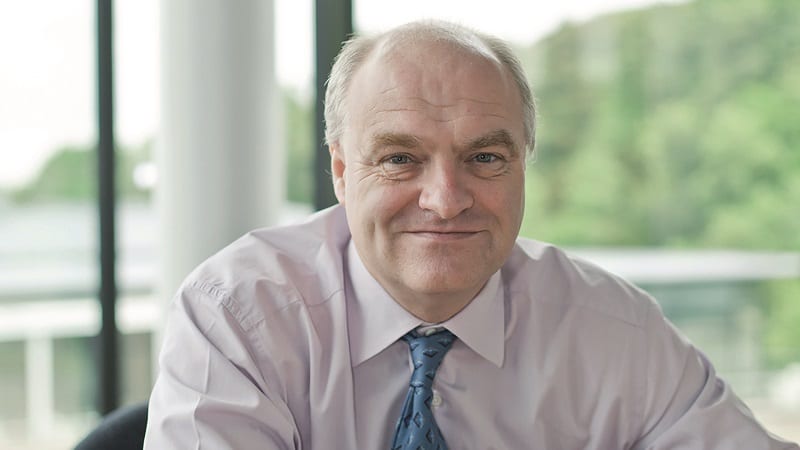Scottish Mortgage’s unquoted exposure has crept above its investment policy limit after its larger listed holdings got caught out in the growth sell-off.
Unlisted investments represented 24.9% of total assets at the end of March 2022, final results for the £16.9bn trust revealed, up from 19.5% at the end of its interim period in September 2021.
A handful of private investments were added to the portfolio during James Anderson’s (pictured) final year at the helm, including synthetic biology firm Solugen, battery recycling company Redwood Materials and online pharmacist Capsule.
The team also participated in several funding rounds for existing unlisted holdings, such as Blockchain.com, Nuro and KSQ Therapeutics.
The level of its unlisted holdings was also pushed higher thanks to the steep share price falls suffered by its largest holdings, such as Moderna, which the results noted has experienced a 70% fall from the highs of last year.
After a record smashing 2021, where it posted a 112% net asset value (NAV) return, Scottish Mortgage delivered one of its most disappointing yearly performances in recent memory as its preferred growth style of investing fell out of favour.
It suffered a 13.1% decline in net asset value during the year, compared to a 12.8% positive return for the FTSE All World index, while its shares sagged by 9.5%.
The trust’s slump has continued post-reporting period, with shares currently down 43% year-to-date.
New unquoted investments ‘restricted’ for now
The brutal share price decline has pushed Scottish Mortgage above its 30% limit for owning unquoteds, according to Jefferies.
It estimates Scottish Mortgage’s unquoted exposure jumped 16% to become 28.9% of total assets in the month after the end of the reporting period.
Assuming no further valuation adjustments on the unquoted side, it expects this to have crept up to 30.4%, which is above the trust’s investment policy limit.
Although the limit is struck at the time of purchase so does not require remedial action, “it will understandably restrict new investment into unquoteds for the time being”, equity analyst Matthew Hose said.
“The current closure of the IPO window unfortunately exacerbates the problem as there is no ‘throughput’ of unquoted holdings becoming listed,” he continued.
“The other side effect is that while the board’s liquidity policy remains in place, share buyback activity has been limited of late, as this would further indirectly increase the relative size of the unquoted portion of the portfolio.”
Scottish Mortgage has weathered two World Wars and the global financial crisis
However, Jefferies still maintained its ‘buy’ rating on the trust.
While the trust’s gearing has increased to 16% at the end of April, Hose pointed out it still has “substantial headroom” to the 35% covenant level.
“The impact of the recent marked decline in NAV is evident in both the increase in gearing and the increase in the relative size of the unquoted investments. The board’s and managers’ approach remains firmly focused on the longer-term though,” said Hose.
Chair Fiona McBain said that despite a turbulent year, “investing in growth companies that help to shape the future has been a successful strategy for as long as there have been stock markets” and there is no reason to think this will change.
“After the past few years of relatively benign market conditions, it is easy to forget how bumpy the ride can become when storms roll in. Scottish Mortgage has weathered more than most: the Great Depression; two World Wars; the global financial crisis, to name but a few.
“Over time, experience has shown that it is not the ferocity of any market storm that matters, it is what one does during it that will most influence outcomes for shareholders. In such times, one must not let the stress induced by such volatility shorten time horizons or prompt decisions taken to reduce discomfort, to the potential detriment of maximising long term shareholder value.”
So long James Anderson
She also thanked outgoing lead Anderson for “22 years of loyal service”.
“It is difficult to find words to adequately thank James on behalf of shareholders,” she said. “The investment returns during his tenure as manager, then joint manager, speak for themselves: from 30 April 2000 to 31 March 2022, the company produced returns of 1,155% in NAV terms and 1,483% in share price terms against a FTSE All-World Index return of 354%.”
She added that the board was confident in the future of the trust under lead manager Tom Slater and deputy manager Lawrence Burns.
“A hallmark of James and Tom’s tenure was the constant drive to observe, learn, and improve which resulted in an investment philosophy that continued to evolve. The board has full confidence that it will continue to do so under the excellent partnership that has already been established between Tom and Lawrence.”










